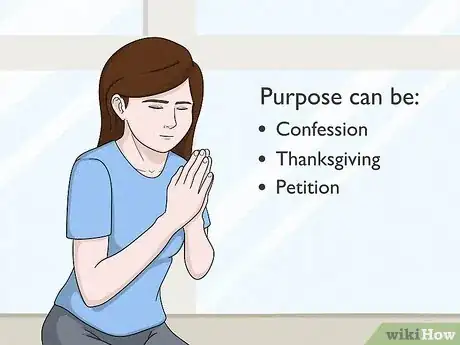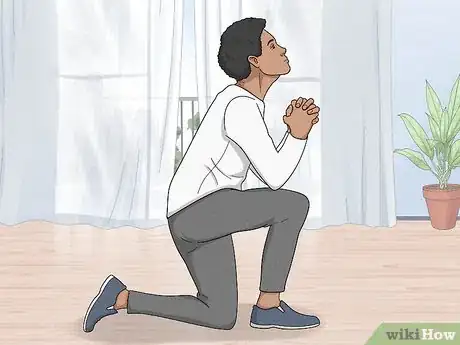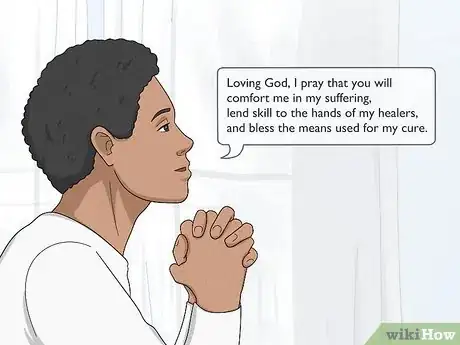wikiHow is a “wiki,” similar to Wikipedia, which means that many of our articles are co-written by multiple authors. To create this article, 137 people, some anonymous, worked to edit and improve it over time.
This article has been viewed 1,422,409 times.
Learn more...
In the broadest sense, to pray is to make a request in a humble manner.[1] The term to pray is now often used to refer to religious prayers: to commune with a spirit or deity that you believe in. While the rituals and conventions of prayer may vary widely, the intention is the same--to renew one's spiritual connection with a power outside themselves.[2]
Steps
When, Where & Why
-
1Take the time to pray. No matter how you pray or whom you pray to, it can be difficult to find time for prayer during busy times. One way to deal with this is to make prayer part of your daily routine, such as praying as soon as you wake up in the morning, right before you go to sleep, or before every meal.[3] There is no wrong time to pray.
- Many people pray during emotional times, like when they feel sad, scared, or happy. You can pray at any time of day, and as much or as little as you feel is sufficient for your spiritual life. Some people make it their goal to maintain a state of prayer all the time by remaining conscious of their spiritual connection throughout the day.
- Observant Jews pray 3 times a day (Shacharit, Minchah, and Maariv/Arvith) and Muslims pray 5 times a day.[4] Still others pray completely spontaneously, when the mood calls or when certain occasions arise (for one's parents, before a meal, etc.). In short, do what you feel compelled to do.
-
2Find a good spot to pray. You will find that you can pray anytime, anywhere, anyhow.[5] It may help to be in a place where the focus is on spirituality (such as a church or temple) or where the environment reminds you of your spiritual bond (like a natural setting, or a spot with a big view). You can choose to pray in the presence of others, or you can pray privately.
- For some religions, like Buddhism, meditation is a standard form of prayer (or, sometimes, prayer is a standard form of meditation). Finding a place where you can quiet yourself and feel connected to your spirituality is an equally respectable form of prayer. Whether an open field or a bowing congregation zens you, find your "place of worship."
Advertisement -
3Know your purpose. Often, prayer accompanies a ritual, giving purpose to the prayer. It can be a lengthy fire-burning ceremony offering sacrifices to ensure good luck the coming season or it can be a simple, thoughtful utterance in thanks for a meal. It does not have to ask, plead, question or thank; all it must do is appreciate.
- Prayer can be a conversation, but it certainly doesn't have to be. Some religions relish prayer as an opportunity for intellectual contemplation. In addition, prayer does not have to have anything to do with you. Roman Catholic tradition includes specific prayers and devotions as "acts of reparation," or amending others' sins.[6]
- Once you know why you're praying, is there anyone specific you're thinking of to talk to? If you are looking to have a dialogue, who with?
-
4Understand that prayer does not have to involve crafted, reflective silence. It can be virtually anything. Song and dance have long been parts of many religions' repertoires of prayer. Even some Christians pray while exercising their body![7]
- Whatever gets you closer to your spirituality, your God, can be an activity of prayer. If a runner's high gets you there, fantastic. If curled up in your sheets does, great. You can scream at the top of your lungs and dart for the hilltops if it makes you appreciative, full of wonder, or thankful.
The Act of Prayer
-
1Get into your prayer position. This depends on the belief you have, if any. Sometimes expressing your thoughts physically can make the experience more complete. People vary in how they position themselves during prayer: sitting, kneeling, lying down on the floor, hands folded, clasped, or raised high, holding hands with other people, head bowed, dancing, prostrating, whirling, swaying, and so on. Some people even pray with their eyes open; and some closed.
- Every religious person has beliefs that feel right for them. What feels right for you? In addition to thinking about the position of your body, consider the position of your body in space. Some religions believe in facing a certain direction during the act of prayer (toward Mecca, for example). If there's a spiritual place in your life, consider its place relative to you.
-
2Prepare for praying. Dependent upon your belief, you may have a ritual way to prepare for praying. You may find that it gets you in the right mindset. Prepare in whichever way you feel is comfortable or appropriate.
- All around the world, people are washing, anointing with oil, ringing bells, burning incense or paper, lighting candles, facing specific directions, making the sign of the cross, or fasting. Sometimes the preparation is directed by someone else, such as a spiritual friend, a group prayer leader, or a teacher of your beliefs. It can be in the few minutes beforehand (such as washing or the sign of the cross) or it can be for days or even weeks (in the case of fasting).
- Many religions take your appearance into account. Certain clothes are deemed appropriate or inappropriate for prayerful gatherings. If for some reason you find your current dress distracting, opt for a presentation that is more reminiscent of you and your spirituality.
-
3Begin the prayer. You can pray by speaking out loud, thinking, singing, etc. Some prayers are recited from memory or read from a book, while other prayers are more like conversations.[8] You may open the prayer by calling on the God(s) or Deity(s) you are praying to, and asking for help (or whatever your intention).
- There is no wrong way to go about it. If a memorized prayer or chant delivers the point of your intended message, there is no need to go about searching for words. But if you have a specific thought, question, or concern in mind, any informal dialogue counts just as much.
-
4Make the request, ask the question, or just make your voice heard. You can ask for answers, seek strength, send good wishes to others, or give thanks.[9] Perhaps the most basic forms of prayer are requests for help in becoming a good (or better) person, and requests that your deity(s) direct your prayer.
- There is no length of time necessary for a prayer. After all, the big guy upstairs (or one of the big guys (girls)) would certainly appreciate even a "Hey, thanks!"
- Clearing your mind and becoming silent can be a useful part of prayer. Don't feel the need to be constantly thinking, talking, or listening for messages. You may find a clearer mind that has the answers in contemplative silence.
-
5End the prayer. Some people end or close the prayer with a special word, phrase or a gesture, or simply by standing or sitting in silence for a minute or two, or saying "Amen."
- You'll know when your prayer is complete. Remove yourself, still reflectively, from your position or location and go about your day, a little more spiritually than before.
Prayers or Spiritual Actions by Faith
- Buddhism
- Christianity
- Hinduism
- Islam
-
Judaism
- How to Perform Netilat Yadayim
- How to Practice and Memorize Prayers for Your Bar or Bat Mitzvah
- How to Blow a Shofar
- Nature/Pagan
-
Unitarian Universalist
- How to Say a Unitarian Universalist Prayer
-
Zen
- How to Do Zazen
- How to Begin Zen Meditation (Zazen)
Community Q&A
-
QuestionHow many hours a day should I pray?
 Community AnswerThe amount of time usually isn't as important as the quality of time. Pray first thing, if you can, because it's always ]good to connect with God before you begin your day. And pray as long as you are able to. Remember, prayer is spending time with God, not a competition or a performance.
Community AnswerThe amount of time usually isn't as important as the quality of time. Pray first thing, if you can, because it's always ]good to connect with God before you begin your day. And pray as long as you are able to. Remember, prayer is spending time with God, not a competition or a performance. -
QuestionHow can talk to God about my family problems?
 Community AnswerJust pray. Stay relaxed. Sit in a meditation position, then take a deep breath to relax, then you pray. Tell God what happened with your family, pray to God for smoothness in your life, but don't forget to be thankful and grateful always. Then just breathe, let go of what it was, and accept what happened.
Community AnswerJust pray. Stay relaxed. Sit in a meditation position, then take a deep breath to relax, then you pray. Tell God what happened with your family, pray to God for smoothness in your life, but don't forget to be thankful and grateful always. Then just breathe, let go of what it was, and accept what happened. -
QuestionWhat words should I use to pray to God?
 Community AnswerTalk to God with your regular vocabulary, as you would to a family member or friend. If you're looking for specific prayers to recite, the Lord's Prayer is a good one. You could also pray many of the psalms.
Community AnswerTalk to God with your regular vocabulary, as you would to a family member or friend. If you're looking for specific prayers to recite, the Lord's Prayer is a good one. You could also pray many of the psalms.
Warnings
- Prayer is not a guaranteed quick fix. Sometimes people have results through prayer, but many times, the results of prayer are subtle.⧼thumbs_response⧽
- There is no right way to pray, and you should never feel pressured to pray in a way that makes you feel uncomfortable.⧼thumbs_response⧽
- If you suffer from bad dreams, try praying in thanks and praying blessings mostly for others to find peace.⧼thumbs_response⧽
- Don't be blasphemous, meaning do not pray and then do something that is not consistent with your spirituality, expecting the prayer to serve as compensation (prayer is not punishment or just to make up for failings).⧼thumbs_response⧽
References
- ↑ http://www.merriam-webster.com/dictionary/Pray
- ↑ Zachary Rainey. Ordained Minister. Expert Interview. 19 May 2019.
- ↑ Zachary Rainey. Ordained Minister. Expert Interview. 19 May 2019.
- ↑ http://en.wikipedia.org/wiki/Prayer
- ↑ Zachary Rainey. Ordained Minister. Expert Interview. 19 May 2019.
- ↑ http://en.wikipedia.org/wiki/Acts_of_reparation
- ↑ http://www.jtsa.edu/miriams-song-and-the-role-of-music-in-prayer
- ↑ Zachary Rainey. Ordained Minister. Expert Interview. 19 May 2019.
- ↑ Zachary Rainey. Ordained Minister. Expert Interview. 19 May 2019.
About This Article
To pray, get into whatever prayer position feels most natural to you. Try sitting, kneeling, or lying down, with your hands clasped or held up. Then, start to pray in whatever way feels right to you: by speaking out loud, thinking, singing, dancing, reading, or calling on the god(s) you’re praying to. You can ask for answers or strength, send good thoughts to others, give thanks, or even have a simple conversation. When you’re ready, end the prayer with a word, phrase, or gesture. Let the spirituality and peace you feel carry you through the rest of your day. If you want to learn specific prayers based on what religion you believe, continue reading the article!




































































